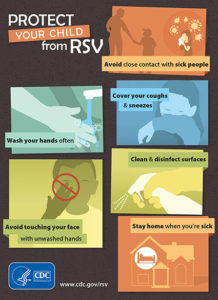What first appears as a typical cold can lead to more serious complications for infants and those more vulnerable this winter.
Respiratory Syncytial Virus, or RSV, is a common respiratory virus that produces mild symptoms according to the Centers for Disease Control and Prevention. However, Guthrie County Hospital Pediatrician Dr. Cody Silker says this virus is most harmful for those younger than two-years-old, “It affects them the most because usually what will happen is it’s not just a common cold sometimes with them. It will affect more their lungs and it’ll cause something called bronchiolitis, which bronchiolitis is this inflammation of small airways in your lungs, (it) also can cause pneumonia as well.”
Most people recover from RSV in a week or two, but Silker describes how symptoms can become more severe for infants, “What’ll happen there they’ll start having breathing problems, they’ll start not to eat very well, they’ll start to have lots of secretions, and with that age especially they can’t really get rid of those very well. So then it starts affecting their eating, they get dehydrated, they start working hard to breathe. So that’s why (in) most populations those are the ones that do get hospitalized more often with it and that need to have more support.”
The CDC says on average in the U.S. there are 2.1 million outpatient visits each year among children younger than five-years-old, and 57,527 hospitalizations for RSV. Recommended ways to protect your child from the virus is to wash your hands often, avoid close contact with sick people, avoid touching your face with unwashed hands, cover your coughs and sneezes, clean and disinfect surfaces, and stay home when you are sick.


